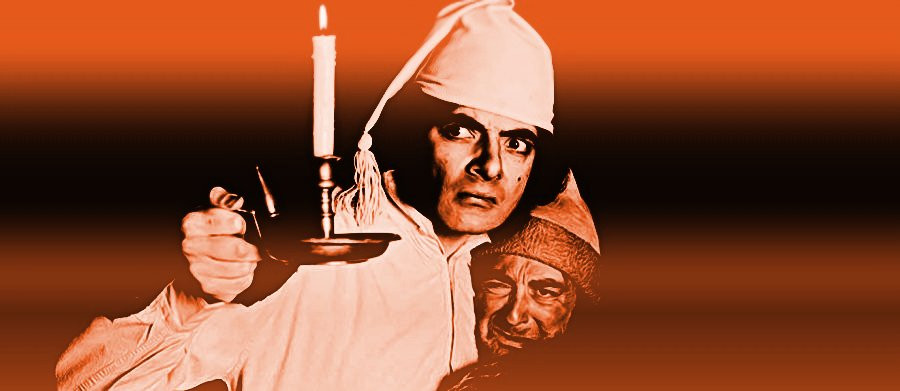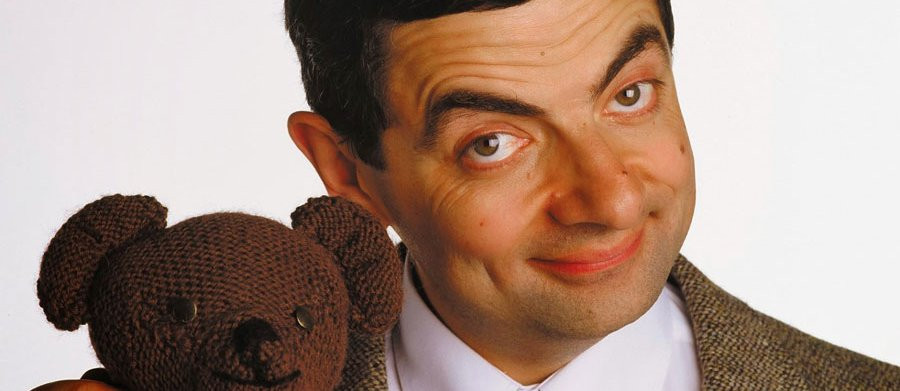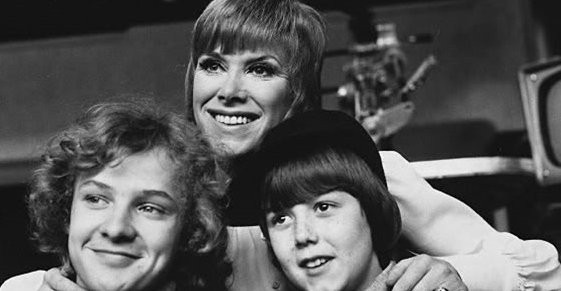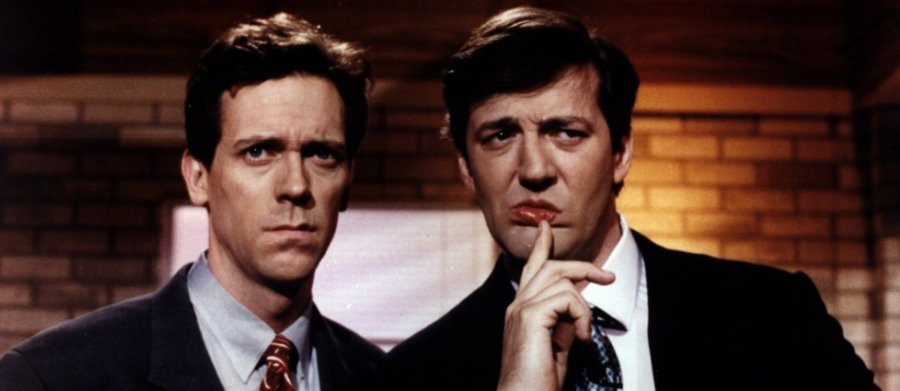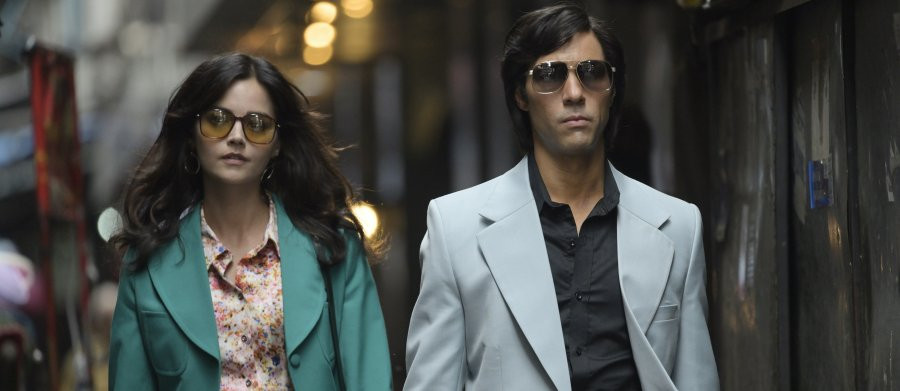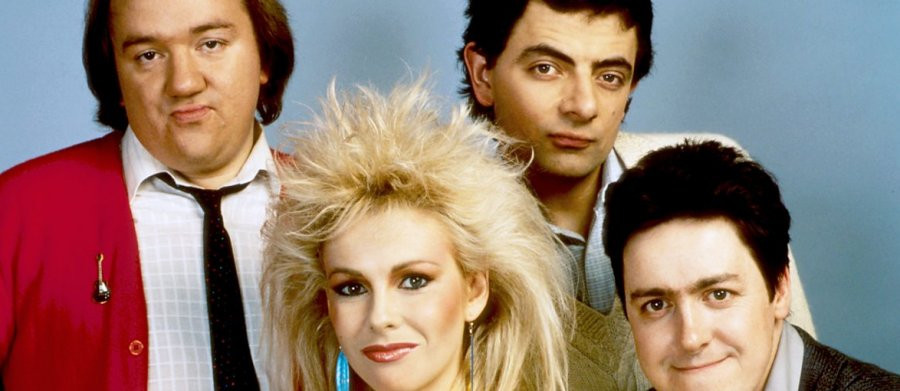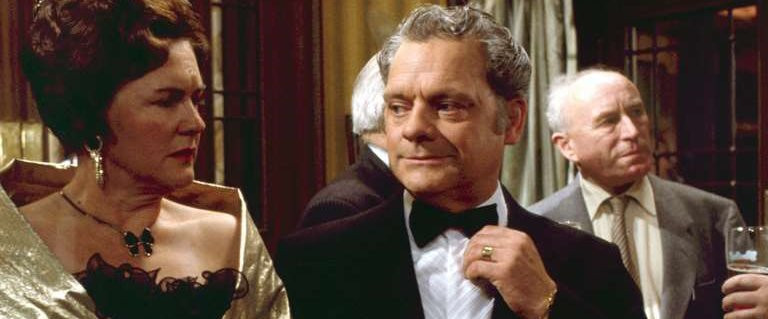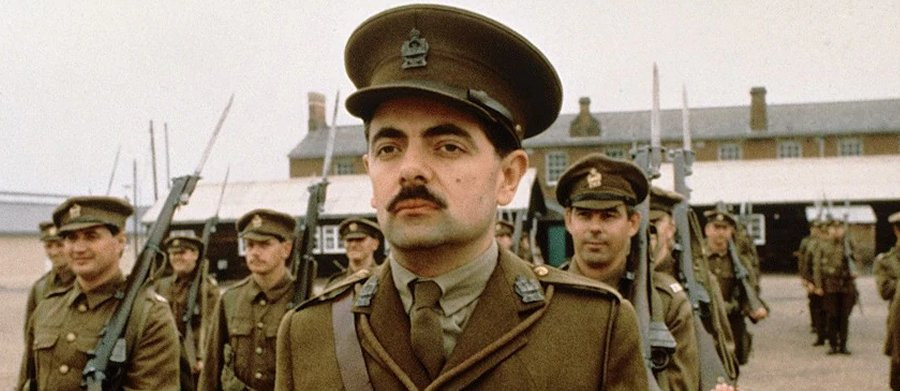
Blackadder Goes Forth
Review: Daniel Tessier
The fourth and final series of the Blackaddersaga, Blackadder Goes Forth moved yet further through history, coming to a point in living memory of some of the older viewers. Blackadder Goes Forth is set in 1917, the penultimate year of the First World War; airing in 1989, a mere seventy-two years later, it's a far cry from the ancient history that the programme began with. There were fears at the BBC that Richard Curtis and Ben Elton's decision to turn the Great War into a sitcom would trivialise the tragic losses of the conflict – potentially very insulting to many viewers. However, the wry scripts became a poignant and powerful treatise on the futility of war – with plenty of fart and knob gags for good measure.
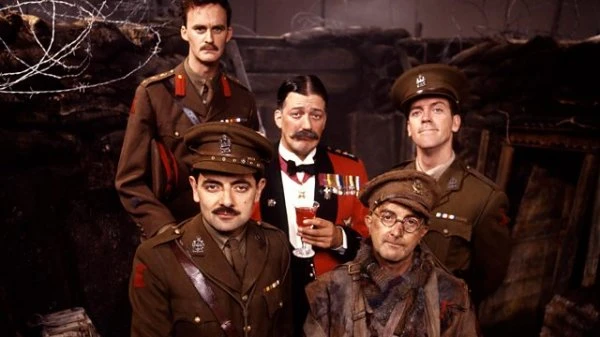
The latest iteration of Rowan Atkinson's eponymous protagonist is Captain Edmund Blackadder, a career soldier who is horrified to find himself fighting trench warfare after years of fighting colonial wars against African natives "two-feet tall and armed with dry grass." As acerbic and world-weary as ever, he is filled with contempt for both the enthusiastic volunteers beneath him and the out-of-touch brass above him. He is, as ever, saddled with feeble-minded underlings – Baldrick and George, new iterations of the regulars from Blackadder the Third . Somehow the pair of them have reached levels of stupidity undreamt of in the history of the programme.
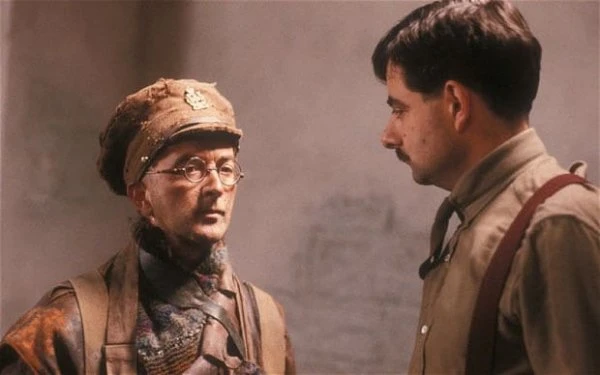
Private S. Baldrick (as always, Tony Robinson) is more worldy-wise than most of his ancestors, being a wannabe anarchist with Bolshevist leanings, but he's still incapable of telling his arse from his elbow and can't even manage the complexities of I Spy. He is also the de facto cook for the section of the trenches that he inhabits, in spite of being the single most revolting cook in the entire universe.
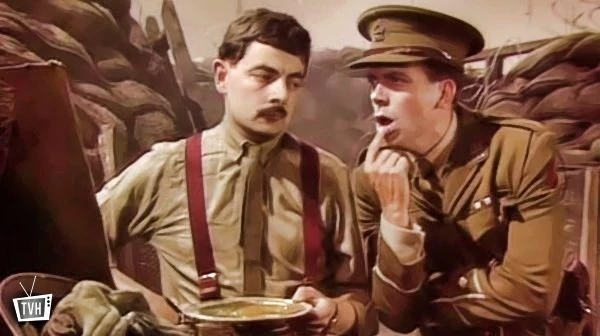
Hugh Laurie returns as Lt. The Honourable George Colthurst St. Barleigh (the characters' full names being included in the military style credits). Presumably a distant, illegitimate descendant of Laurie's previous character, Prince George, the Prince Regent, George is almost as stupid as Baldrick, struggling to count beyond five and driven by unquestioning enthusiasm for everything. The definitive upper-class twit, George can't wait to give the Germans a good seeing to, forgetting that he'll likely be dead within thirty seconds of entering the battlefield.
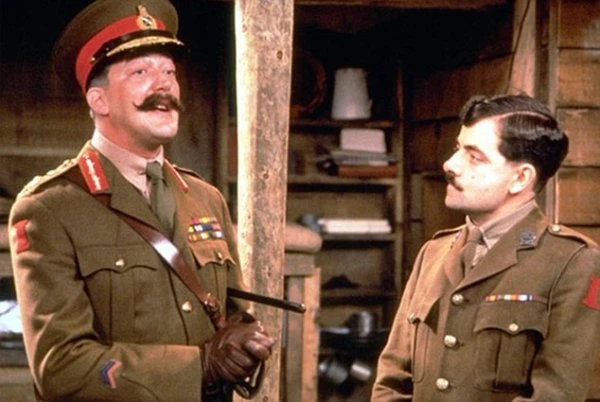
The fourth series reunites two of the regular stars of the second, rounding out the five-strong main cast. Stephen Fry plays General Sir Anthony Cecil Hogmanay Melchett, the highly decorated but simple-minded and blinkered commanding officer of the series. A loud-mouthed, bullish fool, General Melchett is a distant descendant of Lord Melchett from Blackadder II, but far more idiotic. Fry goes all out with his performance, becoming notorious for his continual, deafening barks and bleats, not to mention grunts and gasps when he sat down (Fry having made the inspired decision to play the General as suffering from haemorrhoids).
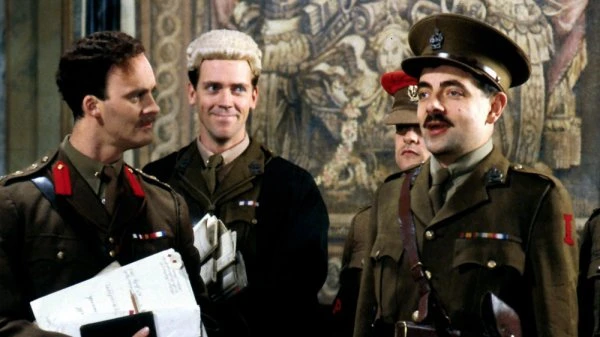
Also returning is Tim McInnerny, formerly the Lords Percy in the first two series of Blackadder, now playing Melchett's right-hand man Captain Kevin Darling. Originally named Captain Cartright, the writers decided to give him a tragically embarrassing name that made him wince every time he heard it. Indeed, McInnerny has mentioned often in interviews that it took him a couple of weeks to get the hang of the twitch, and several months to get rid of it. Jobsworth penpusher Darling is an entirely different character to Percy – far more intelligent, and easily the only one who is Blackadder's equal. Unfortunately, they can't stand each other, with Darling despising Blackadder's shirking of his duties and Blackadder jealous of Darling's cushy position behind the lines.
The series revolves around Blackadder's continual attempts to avoid going over the top, with each episode seeing him find a new way to avoid the orders, and often escape the trenches altogether for a time. Each episode (originally designated on paper as Plan A, Plan B etc...) has a wonderfully punning title that ties in with the theme. " Captain Cook" starts the series, with Baldrick's cunning plan to escape active duty being to become Melchett's private chefs (although this terrible idea goes by the wayside when the opportunity to become war artists presents itself). This is followed by " Corporal Punishment," in which Blackadder's continual ignoring of orders and his crimes as "the Flanders pigeon murderer!" see him court martialled and scheduled for execution.

"Major Star" brings back a favourite character from Blackadder II: Gabrielle Glaister returns as a new version of Bob, disguised as a strapping young chap in order to get into the British army. "I want to see a war fought, so badly," she says. "Well, you've come to right place," returns Blackadder, "a war hasn't been fought this badly since king Olaf the Hairy, high chief of all the Vikings, accidentally ordered 80,000 battle helmets with the horns on the inside." A bawdy romp, the episode sees Blackadder attempt to become the director of a show to tour the lines, with George dragging up as the "fair Georgina" and accidentally becoming engaged to Melchett.
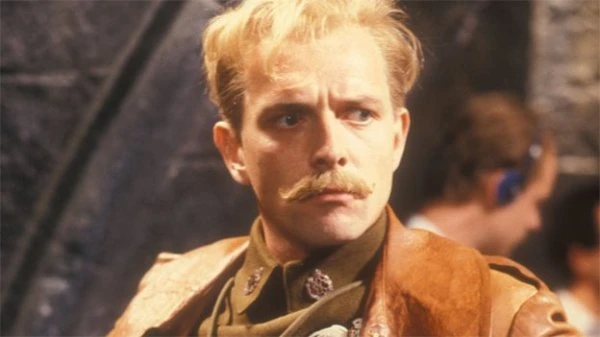
"Private Plane" follows suit with Rik Mayall returning to the programme as Squadron Leader the Lord Flashheart, somehow even more OTT than before. This version of the character is a flying ace and Baldrick's hero, and convinces the "trenchie-types" to join the Twenty-Minuters – unbeknownst to them, named for the average life expectancy of a new pilot. With Blackadder and Baldrick captured by the Germans, the outlook is grim, until Flashheart comes to the rescue. This episode sees Adrian Edmondson make a guest appearance as the villainous Baron von Richthofen, allowing Mayall to shoot his longtime comedy partner dead. Mayall and Edmondson were co-stars of The Young Ones(and later Bottom), and this episode is a big reunion. The episode " Bambi" in The Young Onesguest-starred Robinson, Laurie and Fry, and even had an appearance from Ben Elton – co-writer on both series.
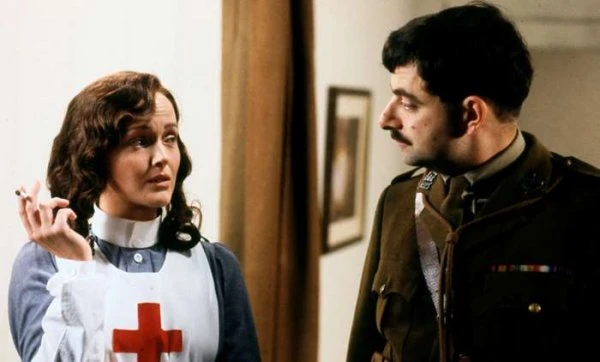
Fifth episode "General Hospital " begins with an episode of I Spy and continues with Blackadder searching out a real spy in the field hospital. The episode features a brilliant guest appearance by Miranda Richardson (formerly Queenie in Blackadder IIand Blackadder's Christmas Carol, and the Shadow in Blackadder the Third ) as Nurse Mary, with her character and Blackadder finally consummating their centuries-long sexual tension. The episode features some spectacular one-liners, but the best one was allegedly ad-libbed by Fry. When Blackadder points out his trap – that the spy didn't realise that out of Oxford, Cambridge and Hull, only two are great universities – Fry jumped in with "That's right. Oxford's a complete dump!" Atkinson is visibly non-plussed, as he might well be; he, along with Richard Curtis, went to Oxford. Fry and Laurie, of course, were Cambridge Footlighters.
Compared to the other series, which certainly weren't short on their grim moments, Blackadder Goes Forth is rather dark, with a defeatist streak to its humour. Unlike the rest of the saga, which see Blackadder scheming to improve his standing and make money, Blackadder Goes Forth sees him just trying to stay alive for a bit longer. While he triumphs in the short term, we know his days are numbered and that eventually he will have to go over the top. The series trades heavily on the popular view of World War I as involving "lions led by donkeys," although there are a fair few donkeys in the trenches as well. The two standing sets – Blackadder's dugout and the General's headquarters – are a thirty-five miles and an entire world apart. While Melchett and Darling enjoy the best food, wine and comfy beds that rank has to offer, the rest of the characters sit in squalor.
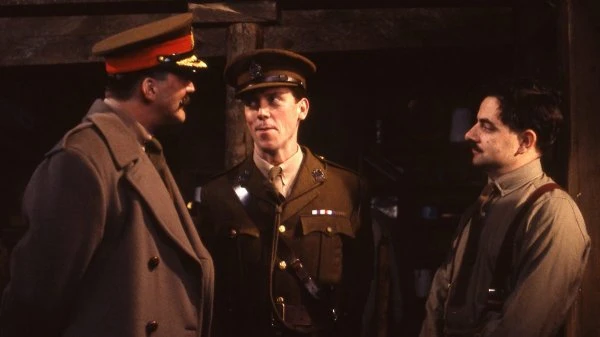
In spite of his contempt for pretty much everyone, Blackadder seems to show a little affection and camaraderie for George and Baldrick, and he even reconciles with Darling at the very end. Even Melchett is not entirely unsympathetic; he has a soft spot for George, whom he has known since he was a boy, and he comes to see Darling as a sort of son. "Not a favourite son, of course, more an illegitimate, backstairs kind of sprog." Blackadder Goes Forth is often cited as the best of the four Blackadder series, and it's definitely the case that Elton and Curtis had refined the formula to precision. The cunning plans had never been so cunning; the insults never so inventive; the metaphors never so contrived. It's probably a bit brutal to watch if you're German, of course; the Germans are the butt of many, many xenophobic jokes, but at least they lay off the French for a bit.
The final episode, broadcast a mere nine days before Remembrance Sunday, is the programme at its very best. Ditching the title format of the rest of the run, the episode is titled " Goodbyee" from a popular Music Hall song of the time, and this makes it clear how things are going to play out. Finally unable to shirk the order any longer, Blackadder, Baldrick and George (and, eventually, inevitably, Darling) are going over the top, forcing Blackadder to try one last desperate gambit and pretend to be mad. The episode has a bittersweet, resigned air throughout, even as it provides some of the series' funniest lines. Unforgettable is Baldrick's theory on how the war started ("Some bloke called Archie Duke shot an ostrich because he was hungry." "I think you mean the Archduke of Austro-Hungary was shot." "No, there was definitely an ostrich involved.") As the final push creeps ever closer, the tone of the episode becomes more serious and acerbic. Blackadder's one last hope is to contact Field Marshall Douglas Haig himself, whom he once saved from an attack by a native soldier armed with a particularly sharp slice of mango. Perfectly played by the legendary Geoffrey Palmer ( Butterflies, The Fall and Rise of Reginald Perrin , As Time Goes By), the commander-in-chief is seen sweeping toy soldiers off a table into a bin, illustrating his reputed throwaway attitude to the lives of his men.
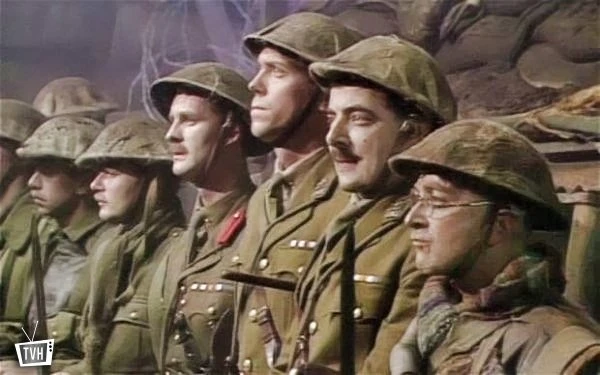
The episode moves to its conclusion with the characters gradually all admitting their terror to each other. Finally, they go over the top, in one of the single most moving moments in television, and certainly the most moving ever for a sitcom. The ending, as originally recorded, saw the characters go into No Man's Land and and take gunshots, falling to the ground, but the take was unusable and ruined the poignancy of the episode. While the original intention by director Richard Boden was to reshoot, the cast simply refused; Atkinson in particular was emotionally shattered by the filming and had felt himself empathising heavily with his character's impending fate. The decision was made to slow down the footage and cut off early, leaving the characters' fates uncertain. While a slow piano rendition of Howard Gooddall's theme plays, the image fades to that of a poppy field, the episode ending without the standard rolling credits. While borne out of necessity, it's an astonishingly effective scene and utterly heartbreaking. Even the radio version works; while most such episodes were broadcast as largely unedited soundtracks, the final scene included poignant lines from each of the main characters in place of the visuals, working almost as well as the televised version.
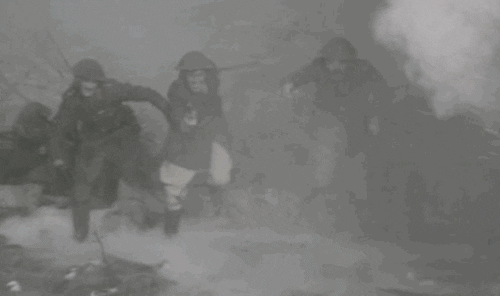
Blackadder Goes Forth, in particular the final episode, has become a beloved staple of British comedy and arguably the definitive televisual depiction of life in the trenches. While it has come under fire from some historians for its extremely critical view of WWI generals, it remains the popular view of the war with the public, making it a source of comedy and pathos alike. The final episode is still shown by British schoolteachers to their classes (resulting in students endlessly reciting Baldrick's poem "The German Guns"). The series won the 1989 BAFTA for Best Comedy Series, and the sitcom, in particular its final episode, is consistently voted one of the very best in British television history. If nothing else, the series legacy is assured by one fact: Baldrick is by far the most popular name for a regimental goat to this very day.
Daniel Tessier
Dan describes himself as a geek. Skinny white guy. Older than he looks. Younger than he feels. Reads, watches, plays and writes. Has been compared to the third, fourth, fifth, sixth, seventh, eighth, tenth, eleventh and twelfth Doctors, and the Dream Lord. Plus Dr. Smith from 'Lost in Space.' He has also had a short story published in Master Pieces: Misadventures in Space and Time a charity anthology about the renegade Time Lord.
Dan's web page can be here: Immaterial
Published on November 6th, 2020. Written by Daniel Tessier for Television Heaven.


